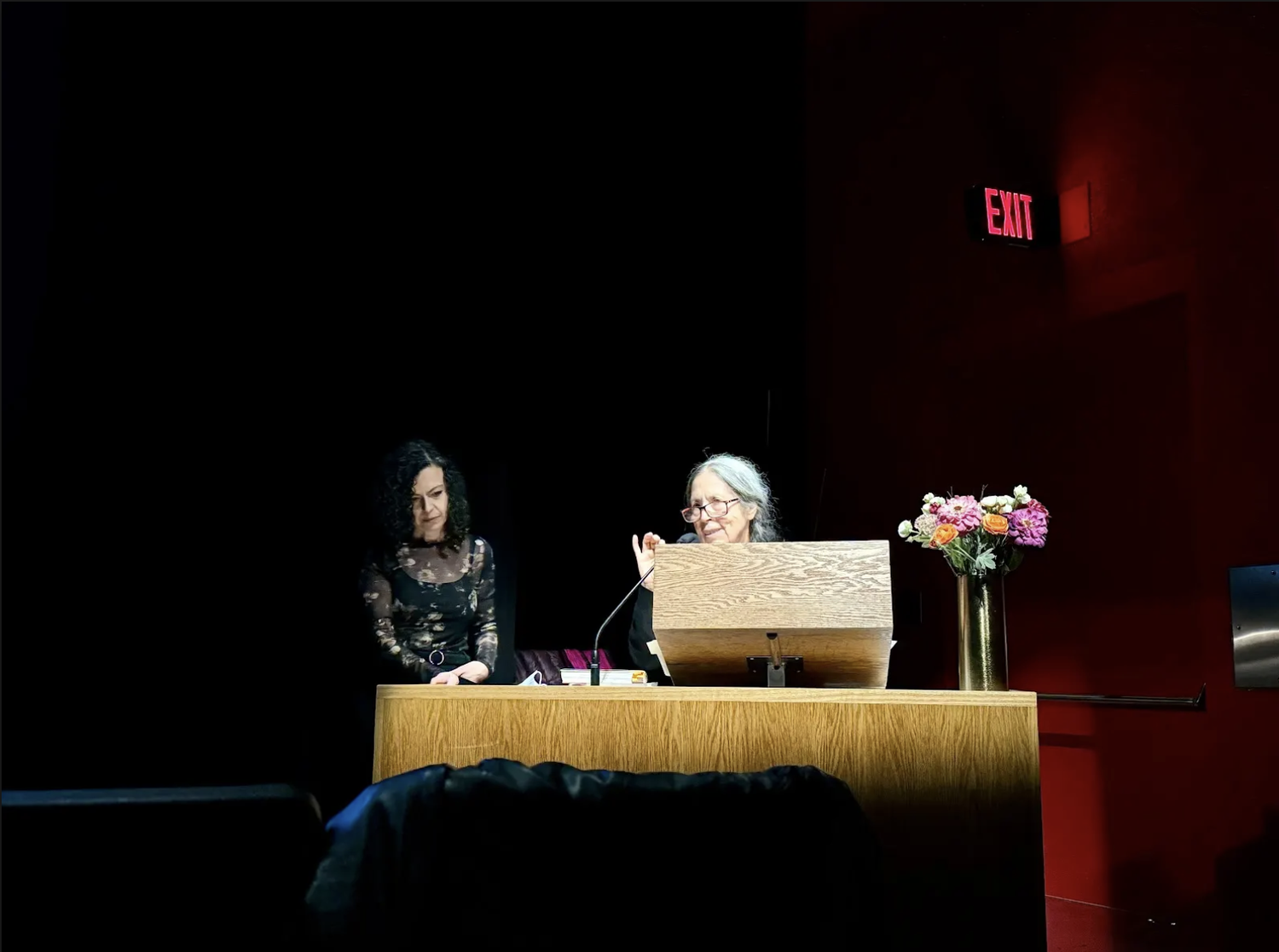
News
Harvard Grad Union Agrees To Bargain Without Ground Rules

News
Harvard Chabad Petitions to Change City Zoning Laws

News
Kestenbaum Files Opposition to Harvard’s Request for Documents

News
Harvard Agrees to a 1-Year $6 Million PILOT Agreement With the City of Cambridge

News
HUA Election Will Feature No Referenda or Survey Questions
Singing Poetry with Illustrations: Cecilia Vicuña’s Poetry Performance with Translator Rosa Alcalá at T.S. Eliot Memorial Reading

On Oct. 24, the Woodberry Poetry Room’s T.S. Eliot Memorial Reading was held in the Carpenter Center for the Visual Arts, spotlighting Cecilia Vicuña’s creative work. As a Chilean poet, artist, pacifism activist, and filmmaker, and the winner of Premio Nacional de Artes Plásticas 2023, Vicuña shared her poetry in an immersive way, dealing with topics such as war, destruction, and eroticism.
Rosa Alcalá, a poet and translator, gave an introduction of Viscuña’s career and artistic work. Alcalá herself has translated many of Viscuña’s collections, including “cloud-net,” “Word & Thread,” “Spit Temple,” and “New Selected Poems of Cecilia Viscuña.” Viscuña’s introduction was thorough and in-depth, showing the breadth of Viscuña and Alacalá’s long-term partnership. She characterized Viscuña’s poems as “epigenetic,” “persistent,” and a “promise of radical change.”
“In many ways, I see her work as trying to return again and again to that playful, erotic exchange with language and other materials, piecing together the remnants of that original pleasure and hope derived from youthful exploration and collective action with the aftermath of various historical and ecological accidents inflicted upon the U.S. and inflicted by us, an obsidian mirror to the Anthropocene,” Alcalá said.
The room fell silent after Alcalá’s powerful introduction, as the audience waited for Viscuña to come up. However, Viscuña did not appear immediately. For a while a projector showed pictures of Viscuña’s artwork. While the audience was absorbed in the drawings, Viscuña’s voice appeared unexpectedly as a strained, quiet singing. Then, Viscuña slowly walked to the front of the room and appeared as a quiet surprise to the audience.
“It kind of trains your attention one way,” David Bouchard, a poet, commented on his experience. “But then you start listening, and you even realize the poet has moved toward the center — toward the front of the room.”
Kelvin McLellan, an audience member and poet, resonated with the unexpected immersive experience of Viscuña’s performance.
“I had never seen her perform before, so I wasn’t expecting to hear music and to hear her voice from behind. But it was full of memorable moments,” said McLellan.
The poetry reading was anything but conventional. It was a complete combination of singing, poetry, and visual art.
“It’s almost like this full, multi-dimensional experience of someone’s creative life. You're surrounded by it musically, visually and linguistically. So there’s something very special and unique about that,” Elizabeth M. Young, a Boston-based poet and educator, said.
Poet and critic Anna V. Q. Ross also admired Viscuña’s multifaceted art and the details of her performance.
“Seeing her drawings on screen, and then also the performance aspect of the people with long strands of wool in the mountains, and hearing her sing her poems, and going between singing and speaking and whispering — it’s pretty,” Ross said. “It fills every sense possible.”
Such an all-encompassing art form and storytelling takes the audience’s full experience along with Viscuña.
During the first part of her performance, Viscuña stood at the podium and started the poetry reading in English. Then she introduced Alcalá to the stage, where Viscuña read in the original Spanish and Alacalá read the English translation. At one point, Viscuña thought it would be more efficient to just have Alaclá read the English translations, but the audience disagreed, as many of them knew Spanish. The dynamic between Alacalá the translator and Viscuña was fascinating to watch.
Young pointed out that it is usually not easy to have the translator read with the author because one ends up dominating the other. But in the case of Viscuña and Alcalá, the mutual understanding cultivated through longtime collaboration made each reading enhance the other.
Even though Ross had attended a live Zoom performance during the pandemic, she felt that the live performance was even more powerful and impressive.
“I think that maybe she can only really be fully experienced live, because you can see all of the different things that she does,” Ross said.
—Staff writer Dailan Xu can be reached at dailan.xu@thecrimson.com. Follow her on X at @Dailansusie.
Want to keep up with breaking news? Subscribe to our email newsletter.
From Our Advertisers

Over 300+ courses at prestigious colleges and universities in the US and UK are at your disposal.

With innovative financial tools combined with financial education, Collegiate empowers students to take control of their finances and build confidence in their money management skills.

Serve as a proctor for Harvard Summer School (HSS) students, either in the Secondary School Program (SSP), General Program (GP), or Pre-College Program.

With an increasingly competitive Law School admissions process, it's important to understand what makes an applicant stand out.

Welcome to your one-stop gifting destination for men and women—it's like your neighborhood holiday shop, but way cooler.

Admit Expert is a premium MBA admissions consulting company, helping candidates secure admission to top B-schools across the globe with significant scholarships.
